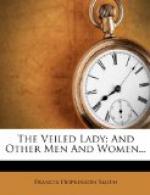“Dogs and trees, my son, will never go back on ye like some folks I’ve hearn tell of. Allers find ’em the same. See that yaller birch over thar?—Well, I’ve knowed that birch over forty-two year and he ain’t altered a mite, ’cept his clothes ain’t as decent as they was, and his shoes is give out ’round the roots. You kin see whar the bark’s busted ’long ’round his toes,—but his heart’s all right and he’s alive and peart, too. You’ll find him fust tree out in the spring, —sometimes ‘fore the sugar sap’s done runnin’. Purty soon, if you watch him same’s me, ye’ll see him begin to shake all over,—kind o’ shivery with some inside fun; then comes the buds and, fust thing ye know, he gives a little see-saw or two in the warm air and out busts the leaves, and he a laughin’ fit to kill. Maybe the birds ain’t glad, and maybe them squirrels that’s been snowed up all winter with their noses out o’ that crotch, ain’t jes’ holdin’ their sides, and maybe, too, them little sunbeams don’t like to sneak in and go to sleep on the bark all silvery and shinin’ like the ribbons on Sis’s hat! They’re human, them trees is, I tell ye, son,—real human!
“And ye want to treat ’em with some perliteness, too they’re older’n anything ’round here ’cept the rocks; and they’ve been holdin’ up the dignity of this valley, too,—kind o’ ’sponsible for things. That’s another thing ye mustn’t forgit. The fust folks that come travellin’ through this notch—’bout time the Injins quit,—took notice on ’em, I tell ye. That’s what they come for. Bald Top and White Face was all right, but it was the trees that knocked ’em silly. That’s what you kin read in the book school-teacher has, and that’s true. And see how they treat their brothers that git toppled over,—by a windslash, maybe, or lightnin’ or a landslide, or some such cussed thing, givin’ ’em a shoulder to lean on same as you would help a cripple. When they’re clean down and done for it ain’t more’n a year or two ’fore they got ’em kivered all over with leaves, and then they git tergether and hev a quiltin’ party and purty soon they’re all over blankets o’ green moss, and the others jes stand ’round solemn and straight like’s if they was mountin’ guard over their graves.
“It’s wicked to kill most anything ’less ye got some use—and a good one, too,—for the meat, but it’s a durned sight meaner to cut down a tree that took so long to grow and that’s been so decent all its life, ’less ye can’t do without the stuff ye git out’n it.”
Joe had listened and had drunk it all in, and his love for the tall giants away back in the deep wilderness had never left him. It was these dear old friends more than anything else that had kept him at home, under plea of helping his father, months after he knew he ought to be up and doing if he would ever be of any use to the old man in his later years.
It was Plymouth first, as stable boy, and then down to Nashua and Boston as teamster and freight handler, and then, by what he considered at the time a lucky chance—(Katie Murdock, from his own town, and now a reporter in the same newspaper office with himself, had helped), man of all work in this whirl where he felt like a fly clinging to a driving wheel.




